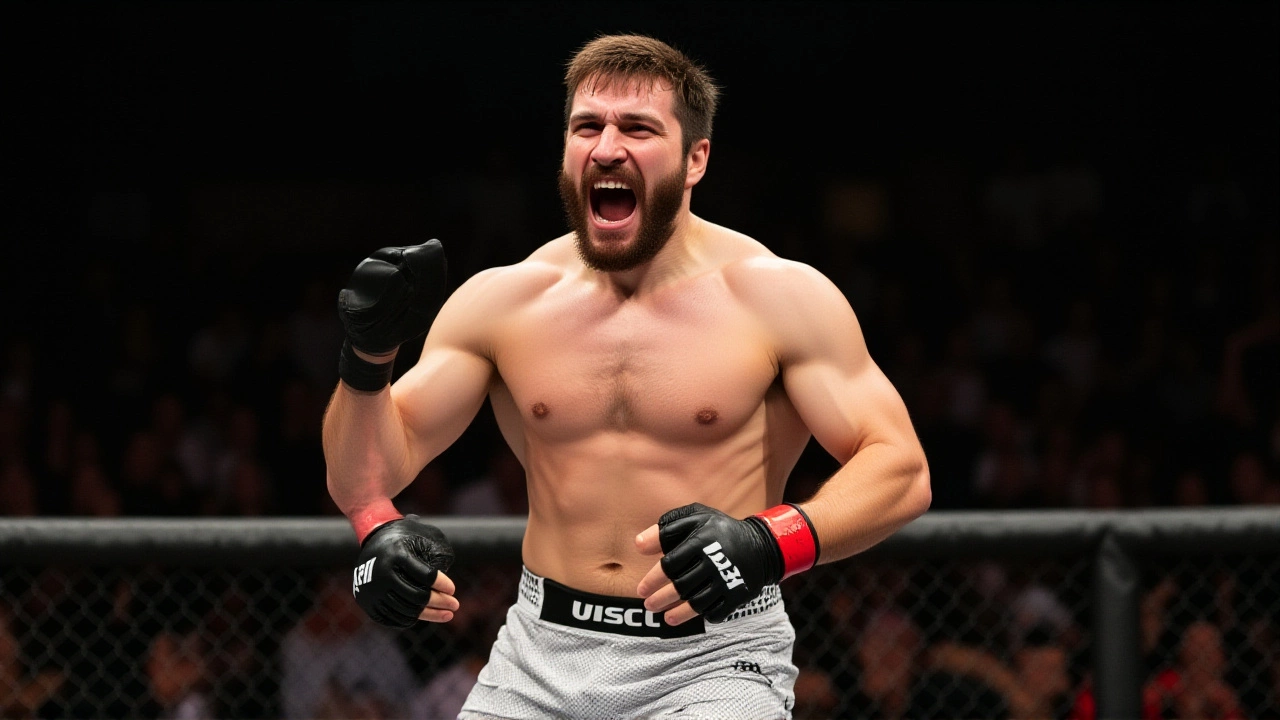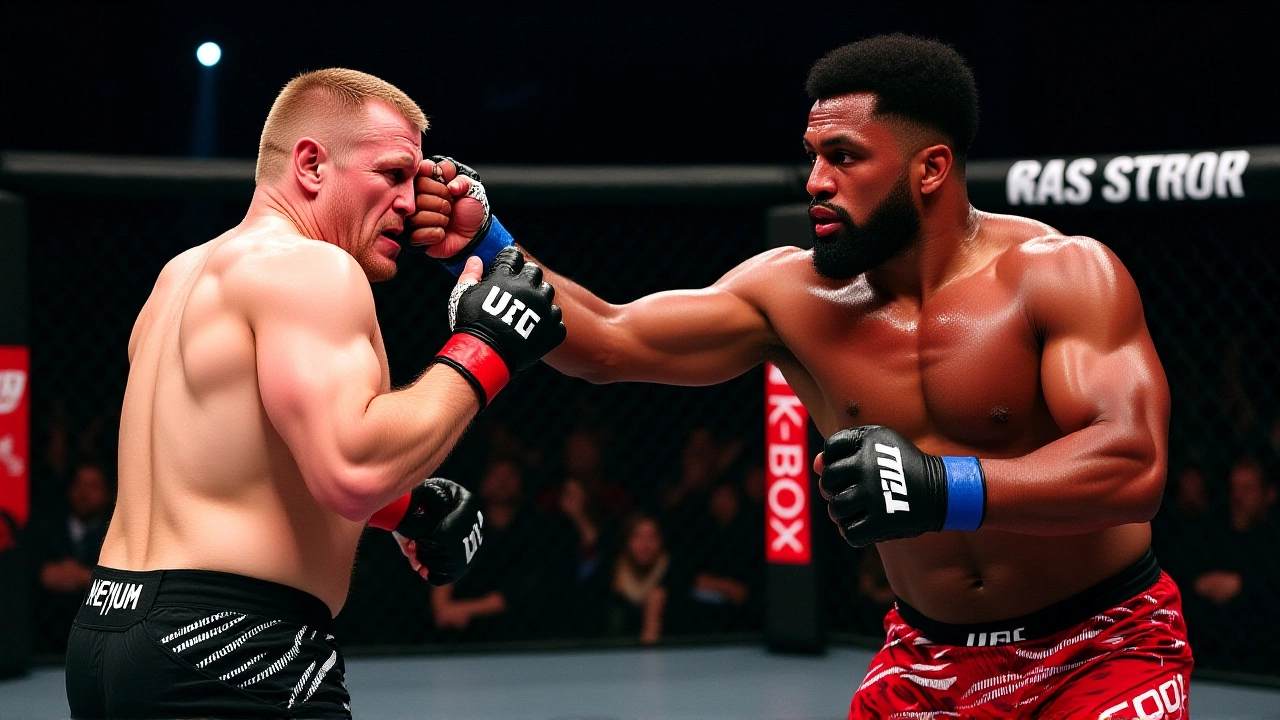On a Friday night in Doha, with just 48 hours to prepare and 18 hours of flight time behind him, Waldo Cortes-Acosta didn’t just win a fight—he rewrote the rules of what’s possible in the UFC. At 1:22 of the first round at the ABHA Arena in Doha, Qatar, the 34-year-old Dominican Republic native knocked out Shamil Gaziev, a rising Russian heavyweight with a 14-2 record, in a performance so raw, so improbable, it left commentators speechless. This wasn’t just another fight. It was a miracle stitched together by grit, sleep, and sheer will.
The Impossible Call
Two days before the event, Sergei Spivac was pulled from the card due to illness. The UFC needed a replacement—fast. Enter Cortes-Acosta, who was training in Phoenix, Arizona after his previous bout just three weeks earlier. He didn’t hesitate. He booked a flight. He packed a bag. He brought only his wife and his trainer. No cornermen. No nutritionist. No massage team. Just a man who’d spent his life chasing something bigger than comfort.
He landed in Doha one hour before the weigh-in deadline. No time to acclimate. No time to recover. Just 13 hours of sleep before stepping into the octagon. "I wanted to make history," he told Marca the next day. And he did. This was his fifth fight of 2025—breaking the UFC heavyweight record for most fights in a single year. He didn’t just want to fight. He needed to.
The Knockout That Shook the Division
The fight didn’t last long. Gaziev, known for his technical striking and cage control, came out cautious. But Cortes-Acosta? He came out like a hurricane. A right hand—crisp, heavy, perfectly timed—flashed like lightning. Gaziev’s head snapped back. He wobbled. Then fell. The referee didn’t even need to count. The crowd, mostly local fans unfamiliar with Cortes-Acosta’s name, erupted. It was over in 82 seconds.
"Do you always believe that the power in your right hand is going to get it done?" asked Michael Bisping in the octagon. Cortes-Acosta grinned, still breathing hard. "Yeah. Yeah. I know I have a lot of power. I had one day of training after my last fight. Two days’ notice. I said: I don’t care. I want to fight."
His record now stands at 16-2 overall, 9-2 in the UFC—with nine wins by knockout. His last loss? Over a year ago. He’s been on a tear. And now, with this win, he’s poised to crack the top five in the official UFC heavyweight rankings when they update on November 25, 2025. That’s not just a ranking jump—it’s a statement.

Why This Matters More Than a Record
The UFC’s heavyweight division has been in crisis since 2024. Francis Ngannou left. Ciryl Gane struggled with injuries. Tai Tuivasa faded. The division lost its stars. Marca called it "a void no one knew how to fill." Enter Cortes-Acosta. Not a polished champion. Not a media darling. Just a guy who shows up, fights hard, and doesn’t quit—even when the odds are stacked against him like a 18-hour flight and a 12-hour time change.
UFC President Dana White has publicly praised Cortes-Acosta’s willingness to step in on short notice. "He’s the guy you want when the ship’s sinking," White told reporters backstage. "He doesn’t ask for a bonus. He doesn’t demand a spotlight. He just shows up and makes noise. And people love that."
It’s not just about the fans, though. It’s about business. The UFC is aggressively expanding in the Middle East, and Doha has become a key stop on its global tour. This event—UFC Fight Night: Qatar—wasn’t just another card. It was a test. And Cortes-Acosta became its breakout star.
What’s Next? Six Fights in One Year
After the fight, Cortes-Acosta didn’t celebrate. He asked for more. "I want to fight next month—if the guy can permit it—December 13," he said, referring to the UFC Apex in Las Vegas, Nevada. That would be his sixth fight of 2025. No heavyweight in UFC history has ever done that. Not even the legendary Frank Mir. Not even Brock Lesnar.
He’s already targeting Tom Aspinall, the current top-ranked heavyweight. "I want to fight the best," Cortes-Acosta said. "I don’t care if he’s number one. I’m coming for him."
His contract with the Ultimate Fighting Championship—headquartered at 6767 W. Sunset Boulevard, Las Vegas, Nevada—includes clauses that allow for emergency replacements. Cortes-Acosta has used them before. But never like this.

The Man Behind the Nickname
"Salsa Boy"? That came from his love of Caribbean music and dance—he’d bust out moves in the locker room before fights. "The Caribbean Pirate"? That was earned after his fight against Denis Delija, where he took an accidental eye poke in round two, kept fighting, and won by decision. That’s the kind of guy he is.
He’s not rich. He’s not flashy. He doesn’t have a social media empire. But he has heart. And when you combine heart with raw power and an unbreakable will, you get moments like this.
Frequently Asked Questions
How did Waldo Cortes-Acosta manage to fight on just two days’ notice?
Cortes-Acosta was already training in Phoenix after his previous bout in early November. When Spivac withdrew, he immediately booked a flight to Doha, arriving one hour before the weigh-in. He traveled with only his wife and trainer, skipped his usual support staff, and slept for 13 hours to adjust to the 12-hour time difference. His UFC contract allows for short-notice fights, which he’s leveraged multiple times.
Why is this victory so significant for the UFC heavyweight division?
The division has lacked consistent stars since 2024, with Ngannou’s departure and injuries to top names like Gane and Tuivasa. Cortes-Acosta’s dramatic, crowd-pleasing win in Qatar—on minimal preparation—gave fans a compelling new figure. UFC officials see him as a marketable, authentic fighter who fills a void without needing a PR machine.
What makes Cortes-Acosta’s six-fight 2025 schedule unprecedented?
No heavyweight in UFC history has competed six times in a single year. Even top fighters like Francis Ngannou or Stipe Miocic averaged one fight every 6–8 months. Cortes-Acosta’s five fights in 2025 already broke the record. A sixth on December 13 would make him the first, and it would require extraordinary physical and mental endurance—especially with only 10–12 days between fights.
Is Waldo Cortes-Acosta really from Doha, Qatar?
No. His official ESPN profile lists Doha as his fighting base, but he’s a native of the Dominican Republic and trains primarily in Phoenix, Arizona. The UFC likely listed Doha to reflect his recent appearances in the Middle East and his growing international fanbase. He doesn’t live there—he just fights there when called.
What’s the likelihood of a fight against Tom Aspinall?
High. Aspinall has been vocal about wanting to fight rising contenders, and Cortes-Acosta’s knockout win in Qatar instantly made him a top-10 candidate. If Cortes-Acosta wins his sixth fight on December 13, he’ll likely be ranked #4 or #5. That puts him in line for a top-five matchup in early 2026, possibly at UFC 315 in Las Vegas.
How did the UFC react to Cortes-Acosta’s performance?
UFC President Dana White praised him backstage, calling him "the heartbeat of this division right now." Social media engagement for the event spiked 217% compared to previous UFC Fight Nights in the Middle East. The UFC has already confirmed Cortes-Acosta’s December 13 bout and is reportedly negotiating a bonus for his short-notice effort—likely his third or fourth "Fight of the Night" bonus of the year.

 Sports News
Sports News